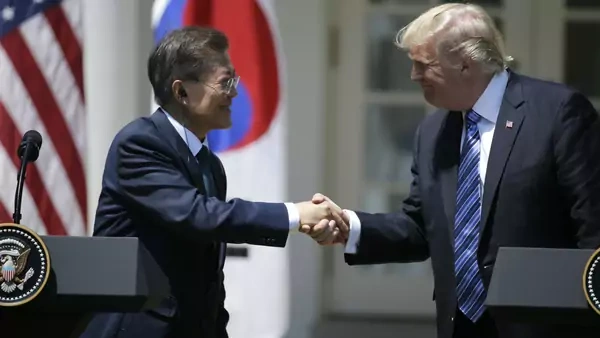China and the U.S.-ROK Alliance: Promoting a Trilateral Dialogue

With increased understanding and mutual trust, the three countries could help denuclearize North Korea, establish crisis management mechanisms, and reach an end state on the Korean Peninsula.
November 7, 2017

- Report
Overview
As the Republic of Korea faces an increasing threat from North Korea, evolving U.S.-China relations are becoming important to Seoul’s strategy for dealing with Pyongyang. The United States and China are competitors, but they also seek cooperation on a range of global issues. And although South Korea seeks to have good relations with both great powers, it is increasingly being pushed to take sides in the ongoing U.S.-China competition. As the U.S.-China relationship becomes more complex, South Korea needs to carefully evaluate its policy toward China in order to find the best ways to ensure Chinese cooperation on the North Korean issue, particularly taking into account China’s evolving view of North Korea.
Under the leadership of Xi Jinping, China is profoundly changing its foreign policy, including its relations with the United States and the two Koreas. With more confidence in its own diplomatic, military, and economic capacity to protect its national interests, China under Xi’s leadership has begun to regard the entire Korean Peninsula as part of its sphere of influence.
More on:
The United States and South Korea should carefully evaluate this shift and its implication. Xi’s new policy orientation on the Korean Peninsula could open a window for greater cooperation on North Korea through a trilateral dialogue and, eventually, regional stability if the United States and South Korea can find a way to coordinate their policies and embrace the newly forming interests of China as a rising great power. The following actions are recommended:
The United States and South Korea should seek to influence the Chinese decision-making process by reducing the distrust caused by the deployment of the Terminal High Altitude Area Defense (THAAD) and by pursuing more flexible formats of strategic dialogues, such as a track 1.7 dialogue, with Chinese experts.
South Korea should intensify diplomacy with China and reach a consensus on stability and the end state on the Korean Peninsula. South Korea should avoid creating the perception that it is becoming part of any effort to isolate or contain China. The United States and South Korea should pledge to use the system only against North Korea in return for China’s commitment to cooperate on the North Korean nuclear issue. The United States and South Korea should also explain technicalities of THAAD to relieve China’s fears that the system would be used against it.
Presidents Donald J. Trump and Moon Jae-in should assure Xi that the U.S.-Korea alliance is not pursuing North Korea’s collapse. They should also seriously consider Chinese proposals on the North Korean issue. The United States and South Korea need to assure China that the future status of the Korean Peninsula, particularly with regard to the alliance arrangement on the peninsula, would not hurt Chinese interests in the region. Against the backdrop of the worst-case scenario, crisis management mechanisms, such as hotlines between and among the United States, China, and South Korea, should be established.
There is greater potential for the United States, China, and South Korea to cooperate on North Korea. To achieve trilateral cooperation, the United States and South Korea should address China’s strategic concerns. The U.S.-ROK alliance is not entirely incompatible with China’s interests. The United States, China, and South Korea need to agree on the priorities in their policies, the first of which should be resolving the North Korean nuclear issue instead of THAAD. With increased understanding and mutual trust, the three countries could help denuclearize North Korea, establish crisis management mechanisms, and reach an end state on the Korean Peninsula.
More on:
 Online Store
Online Store
